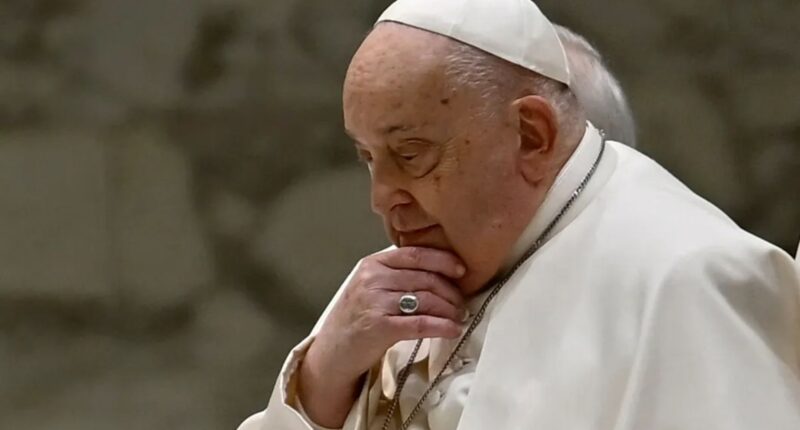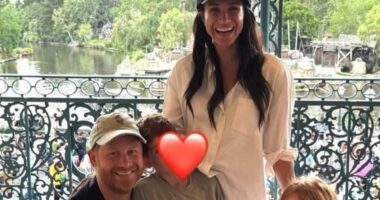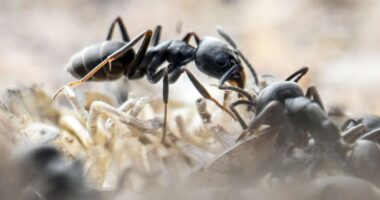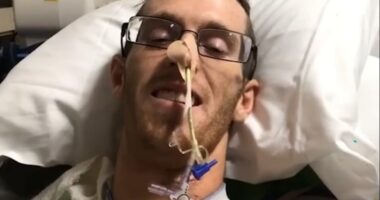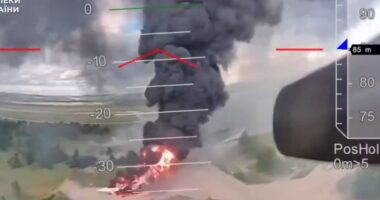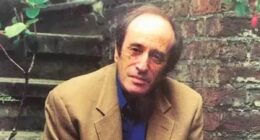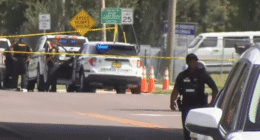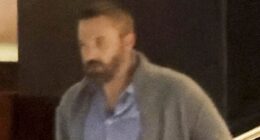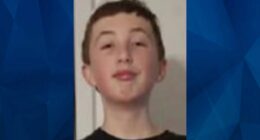THE Pope is up and about after a good night, according to the Vatican, but cardinals now face the question – will Francis resign?
Church officials issued the latest update on the Pontiff’s health as the 88-year-old has spent eight days battling double-lung pneumonia in hospital.



Their statement said: “The night went well, and this morning Pope Francis got up and had breakfast.”
Today’s briefing followed a cautiously positive assessment of the Pope’s condition last night, which officials said showed “slight improvement”.
They added: “He has no fever, and his hemodynamic parameters [blood pressure readings] remain stable.”
According to a report by Politico, the Pope has privately expressed concerns about his chances of surviving his illness. However, Church officials who are praying for his recovery may find comfort in the positive outlook.
Now, cardinals have offered their thoughts on whether Francis will resign – something he has previously admitted considering.
Recently, cardinal Gianfranco Ravasi, the Vatican’s former Minister of Culture, mentioned that Pope Francis might consider stepping down if he felt incapable of fulfilling his responsibilities.
During an interview with an Italian radio station RTL, Ravasi emphasized that there was a possibility of resignation if the Pope felt he could no longer engage directly with people or communicate effectively and decisively.
Historically, it has been custom for the Pontiff to serve until his death – though a handful of Pope’s, including Francis’s predecessor Pope Benedict XVI – have bucked the trend.
And cardinal Jean-Marc Aveline, the Archbishop of Marseille, France, agreed abdication was on the table.
The Frenchman said: “Everything is possible.”
Francis confirmed in 2022 that he wrote a resignation letter shortly after being elected, to come into effect if he became gravely ill and unable to pen one.
But there has been no indication from Francis himself that he is thinking of relinquishing his duties.
While in hospital, he has continue to work and meet with aides.
He also hosted the Italian Prime Minister, Giorgia Meloni, for 20 minutes on Wednesday.



The country’s leader said she wanted to bring get-well wishes to the pope on behalf of the government and entire nation.
A statement from her office read: “We joked around as always. He has not lost his proverbial sense of humour.”
However, it was also reported on Wednesday that rehearsals for the Pope’s funeral were underway.
The Swiss Guard – the force tasked with protecting the Pope – has been practising the funeral procedure and is reportedly “preparing for the pontiff’s death”, reported Swiss newspaper Blick.



The Pope has been staying in a special ward in Rome’s Gemelli hospital since Friday, where he was admitted after a week of suffering from bronchitis.
The Vatican revealed on Monday that he was battling a “complex clinical picture” which involved a “polymicrobial infection of the respiratory tract”.
Officials clarified on Tuesday that he has been diagnosed with pneumonia in both lungs.
Then, two people close to the Pontiff claimed Francis had confided to them that he “might not make it this time”, according to a report by Politico.
The sources also apparently said the Pope was suffering from intense pain and is “tying up loose ends” ahead of his successor.
Being so fragile and elderly means Francis will be vulnerable to complications down the line, even if survives this spell of lung infection.
He is overweight, physically inactive, uses a wheelchair for his bad knees and has already had part of a lung removed.
Nonetheless, cardinal Matteo Zupi, head of Italy’s Catholic bishops and the Archbishop of Bologna, has said he is sure that Francis will pull through.
Speaking at a church event in Bologna this week, he said: “The fact that the Pope had breakfast, read the papers [and] met people indicates that we are heading in the right direction for a full recovery that we hope will happen soon.”
How will the next Pope be chosen?
By Patrick Harrington, foreign news reporter
If the Pope dies his passing must first be confirmed by the Chamberlain of the Catholic church – in the presence of the Papal Master of Ceremonies and other officials.
The Chamberlain then informs the cardinal vicar for Rome, who passes the news onto the city and the world.
After nine days of mourning, during which time the Pope is buried, the task of choosing a new leader arises.
All 252 cardinals will be summoned to Rome from around the world for the Papal election, called Conclave.
The new Pope is decided by a vote, which can be participated in by up to 115 cardinals.
The number is whittled down by excluding any cardinals over 80.
There are secret discussions between the cardinals about who would be a good successor.
Then voting begins in the Vatican’s Sistine Chapel – and continues until a consensus is reached.
However, if there is still no consensus after 12 days, then a new Pope can be appointed with more than 50 per cent of the votes.
Locals are kept updated on the process by twice-daily plumes of smoke coming from the chapel.
Black smoke means the vote is still being deliberated, and when white smoke appears it means a decision has been reached.
